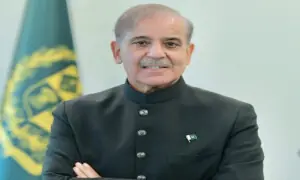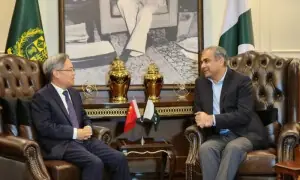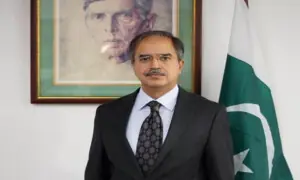Pakistan on path to sustainable economic stability, says Aurangzeb
Finance Minister Muhammad Aurangzeb on Monday said Pakistan has achieved significant progress in macroeconomic stability, adding that the country’s economic direction is now on the right track.
Speaking at a press conference alongside Power Minister Owais Laghari, IT Minister Shiza Fatima Khawaja, and other members of the economic team in Islamabad, Aurangzeb highlighted that international rating agencies have recognised Pakistan’s economic stability.
“The government is implementing a comprehensive agenda of structural reforms,” he said.
“Reforms are being carried out across the tax system, energy sector, and other key areas. Our goal is to ensure sustainable economic stability.”
Aurangzeb also noted that the IMF staff-level agreement serves as validation of Pakistan’s economic trajectory.
He added that reforms, including pension reforms and rightsizing initiatives, are essential for long-term stability.
“Countries like China, the United States, and the Gulf Cooperation Council have supported our efforts,” he said.
Budgetray measures being implemented
Speaking on the occasion, Federal Board of Revenue (FBR) Chairman Rashid Langrial said the government was actively implementing measures approved in the budget, leading to a marked increase in tax collections.
Tax-to-GDP ratio increases
“Tax reforms take time, but for the first time, the tax-to-GDP ratio has increased by 1.5 per cent,” Langrial said.
“This year, income tax filings rose by 18 per cent, and the number of taxpayers has grown to 5.9 million.”
He emphasised that the FBR did not require new taxes, noting that the federal government collected 15 per cent of revenue while provinces contributed 3 per cent.
“Most of the pressure for revenue generation lies with the federal government,” he added.
Govt will not buy electricity
Power Minister Owais Laghari highlighted the government’s efforts to reduce circular debt, citing a Rs1,200 billion debt agreement and a Rs700 billion reduction in the past year.
“A task force on IPPs has made significant progress. The government will no longer purchase electricity unnecessarily, and electricity prices have dropped by 10.5 per cent over the last 18 months,” he said.
Laghari added that energy sector reforms included the introduction of prepaid metering for consumers and technical improvements that have saved billions of rupees.
“Wherever possible, we have provided relief to the public while modernising the energy sector,” he said.
For the latest news, follow us on Twitter @Aaj_Urdu. We are also on Facebook, Instagram and YouTube.

























Comments are closed on this story.